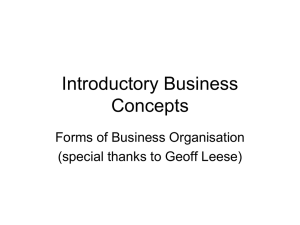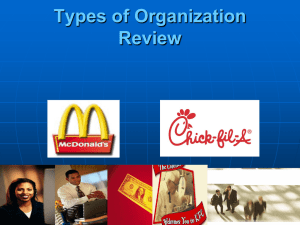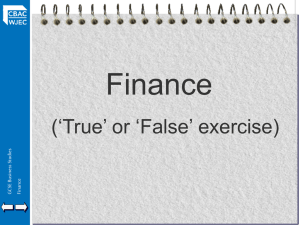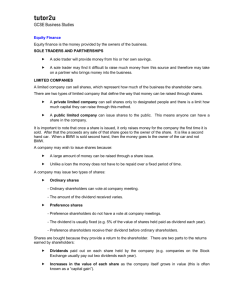Business Ownership
advertisement
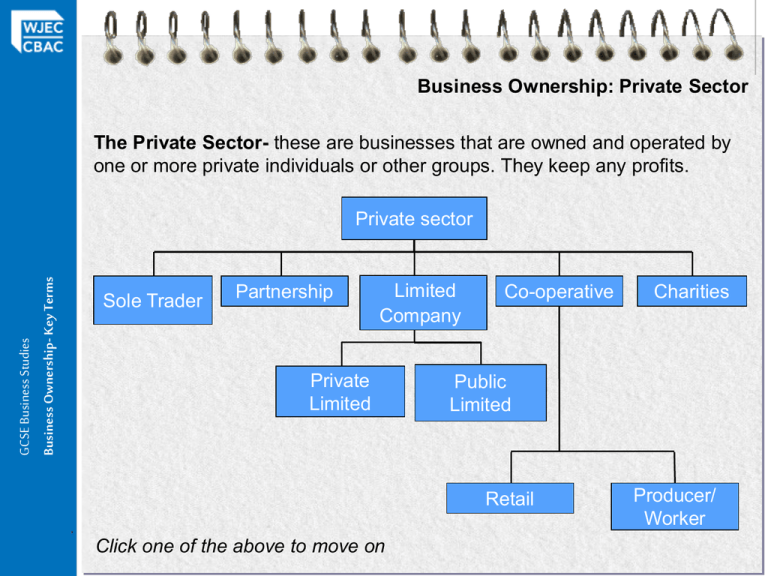
Business Ownership: Private Sector The Private Sector- these are businesses that are owned and operated by one or more private individuals or other groups. They keep any profits. GCSE Business Studies Business Ownership- Key Terms Private sector Sole Trader Partnership Limited Company Private Limited Co-operative Public Limited Retail Click one of the above to move on Charities Producer/ Worker Business Ownership: Sole Traders or Sole Proprietors A sole trader is the most common form of business in the Private sector. GCSE Business Studies Business Ownership- Key Terms A trader is someone who carries on a trade, while a proprietor is one who owns a business How can a sole trader be defined? Advantages and Disadvantages of a Sole Trader Sort out the following statements into advantages and disadvantages: Advantages Disadvantages Difficulty of raising Capital Unlimited Liability GCSE Business Studies Business Ownership- Key Terms Hands-on approach You are your own boss The profits don’t have to be shared No one to share responsibility Staffing issues with holidays and sickness Tax benefits May not have all the skills Easy to run Flexibility Long working hours Small and easy to set up Advantages of Being a Sole Trader 1. Easy to set up A sole trader can set up in business immediately. There are few, if any, complicated forms to fill in. They must however: GCSE Business Studies Business Ownership- Key Terms • • • Fill in an income tax return – for the Inland Revenue Approval from local council – planning permission Register for VAT with Customs and Excise if turnover is above a certain level 2. Be your own boss The owner in a sole-proprietorship is in complete control and so can make whatever decisions or changes that they want. What type of decisions do sole traders typically make? Advantages of Being a Sole Trader 3. Keep all the profits All the profits of the business are kept by the sole trader. They don’t have to be shared with anyone. GCSE Business Studies Business Ownership- Key Terms 4. Privacy Only the Inland Revenue and Customs and Excise need to know how well the business is doing. The business does not have to publish any information for the public – financial information affairs remain confidential. 5. Good labour relations Many sole traders work on their own, others employ one or maybe several workers. How does this affect their labour relations? 1. Unlimited Liability Disadvantages of Being a Sole Trader Sole traders have unlimited liability. This means that the owner is fully liable for all the debts of the business. In the eyes of the law, there is no distinction between the assets and debts of the business and the personal assets and debts of the owner. GCSE Business Studies Business Ownership- Key Terms 2. Difficulty in raising capital Only the Inland Revenue and Customs and Excise need to know how well the business is doing. The business does not have to publish any information for the public – financial information affairs remain confidential. 3. Long hours and ill health Many sole traders work on their own, others employ one or maybe several workers. If the sole trader were to fall ill then they may be forced to shut the business. What happens if sales are still low? What consequences would closing the business incur? Task: Read the case study and answer the questions Edward Walters was employed by a national stationers but was made redundant in January 2005. He spent months searching for another job, but eventually gave up and decided to set up his own business. GCSE Business Studies Business Ownership- Key Terms He had always been a film buff and opened up a DVD rental shop in Cardiff. In a room above the shop he opened up a small café. He used £6,000 of his own savings and a £2,000 bank loan to meet the set up costs. He also qualified for £40 per week from the government’s Enterprise Allowance Scheme. Main menu Edward employed two part time students to help out in the café on weekends and school holidays. After a slow start business picked up and his café gained popularity with students from local colleges. He spotted an opportunity and lowered prices slightly to encourage even more students to visit. After one year he extended his bank loan to £3,000 and bought some more kitchen equipment to provide substantial lunch time meals. Again he kept prices low and targeted the student market. The business expanded and Edward was beginning to enjoy good profits. The shop only made a small contribution to turnover, but he felt that it helped the image of the café which attracted his customers. One morning when he was opening, a local authority representative arrived unannounced to inspect the business premises. After a two hour investigation the inspector left saying that he would hear from the authority the next day. A letter from them informed Edward that his kitchen must conform to a long list of health regulations. Edward estimated that the cost would be £5,000. He arranged a meeting with the bank that same afternoon. Unfortunately they could only lend him half the amount. Edward was eventually forced to borrow from a private loan company, paying high rates of interest. What features of a sole trader does this example show? How does this case highlight the advantages of being a sole trader? How does this case highlight the disadvantages of being a sole trader? Business Ownership: Partnerships A partnership is where there is more than one single owner of a business. The law says that in an ordinary partnership there can be between 2 - 20 partners. The partners are the joint owners of the business. When forming a partnership it is sensible to draw up what is know as a Deed of Partnership. GCSE Business Studies Business Ownership- Key Terms The Deed of Partnership is a legal document which sets out: • • • • • Who the partners of a business are How much money (capital) each partner has put into the business How profits will be shared How many votes each Partner will have in any meetings What happens if any of the partners want to leave the business If there is no Deed of Partnership then under The Partnerships Act 1890 the law states that each partner is equal and gets an equal share of the profits and the same voting power as any other partner. Sleeping Partners & Limited Liability: Main menu A Sleeping Partner is someone who invests money into the Partnership but does not play an active role in the business Sleeping Partners have LIMITED LIABILITY Business Ownership: Limited Companies A limited company has a separate legal identity to that of its owners. This means that the owners of the company (the shareholders) have Limited Liability - if the company goes bankrupt then the owners only lose the money that they have invested in the business (the value of their shares) and will not be forced to sell off their own personal assets. Types of Limited Companies: • Private Limited Companies (Ltd.) GCSE Business Studies Business Ownership- Key Terms • Public Limited Companies (PLC) There are important differences between Private Limited Companies and Public Limited Companies: 1. Sales of Shares The shares of a PLC are sold on the stock exchange – anyone can buy shares. The shares of an Ltd. cannot be openly bought by the public – private individuals only. 2. Share Capital A PLC must by law have at least £50,000 in share capital to set up. An Ltd. can start up with just £2 share capital. 3. Size and Number of Shareholders The number of shareholders is likely to be far greater in a PLC than in an Ltd. – due to the way in which shares can be obtained. PLCs are usually larger than any Ltd. company. Business Ownership: Limited Companies 4. Control GCSE Business Studies Business Ownership- Key Terms In theory, it is the shareholders who own and control a limited company. Each year at the AGM they appoint Directors who represent the shareholders and they in turn appoint managers who run the company. Shareholders (owners) Board of Directors (responsible to owners) Managers (day to day running of the business) In Ltd. managers = directors = shareholders COMPLETE CONTROL In PLC Managers and directors only own a small part of the company and so in practice the shareholders do not control the business DIVORCE OF OWNERSHIP AND CONTROL Business Ownership: Limited Companies Features of Limited Companies: • Separate legal identity from owners – means they can own assets, form contracts, employ people, sue and be sued in their own right. GCSE Business Studies Business Ownership- Key Terms • Owners have LIMITED LIABILITY. Main menu • The CAPTIAL of a limited company is divided into shares. Each member or SHAREHOLDER owns a number of these shares. They can vote and take a share of the profit (Those with more shares have more control and can take more profit). • They are run by DIRECTORS who are appointed by the shareholders. The Board of Directors, headed by a CHAIRPERSON, should run the company as the shareholders wish. • Companies pay corporation tax – a tax on company profits. • A limited company must submit a copy of its annual accounts to the Registrar each year. • The shareholders have a legal right to attend the AGM (Annual General Meeting). Business Ownership: Co-operatives A co-operative is an organisation formed by people joining together to organise production, make decisions, and share profits. All members have an equal say in running the business and share equally in the profits. • It has limited liability • Non-transferable shares (bought and sold to the society) GCSE Business Studies Business Ownership- Key Terms • Society control is democratic, each member is permitted one vote regardless of shareholding. Worker Co-operative: They pool their money to buy equipment and share equally in decision-making and any business profits. Retail Co-operatives: Shops run for the benefit of their customers. Advantages and Disadvantages of Worker Co-operatives Worker- co-operatives have some advantages, linked to the fact that the workers own the business. However, there can be problems with worker co-operatives. Advantages: GCSE Business Studies Business Ownership- Key Terms • There is less likely to be a conflict of interest between the owners and the workers because the profits made by the business go to the workers or are invested in the business to ensure its long-term success. • Co-operatives have a separate legal existence so have LIMITED LIABILITY. Disadvantages: • It is difficult to persuade workers to form a worker co-operative because it is much easier to set up a partnership. • New workers usually have to become owners of the business but may find it difficult to raise money to buy a share in the business. • Very successful worker co-operatives often end up being sold to other limited companies, with workers/owners/ only too happy to pocket the money gained from selling shares. • If the worker co-operative needs extra money to expand the business it can’t look to new members – they have to rely on bank overdrafts and bank loans. Main menu • At worker co-operatives all workers are roughly paid the same (top managers only getting about 3 times the amount of ordinary workers) and so it is difficult to recruit workers like managers who would otherwise be able to get a high salary. Franchises GCSE Business Studies Business Ownership- Key Terms A franchise is not a type of business ownership. It is a way in which a business (the Franchisor) can grow without setting up its own outlets, by allowing other businesses (Franchisors) to use well established brands. Franchisor and Franchisees could be sole traders, partnerships or limited companies. Franchisor Provision Training Equipment Materials GCSE Business Studies Business Ownership- Key Terms What Does the Franchisor Provide? Advertising Brand Name Area Protection Advantages and Disadvantages of a Franchisor Sort out the following statements into advantages and disadvantages: GCSE Business Studies Business Ownership- Key Terms Advantages Disadvantages Low cost New ideas received Rapid growth Profits shared Less risk Franchisor can end the agreement Franchisor has total control Geographical location of franchises Advantages and Disadvantages of a Franchisee Sort out the following statements into advantages and disadvantages: Advantages Disadvantages Training GCSE Business Studies Business Ownership- Key Terms Company advertising Your own boss Profits shared Less risk Franchisor can end the agreement Sharing of information New ideas have to be approved by franchisor Franchisor has total control Someone else’s idea

